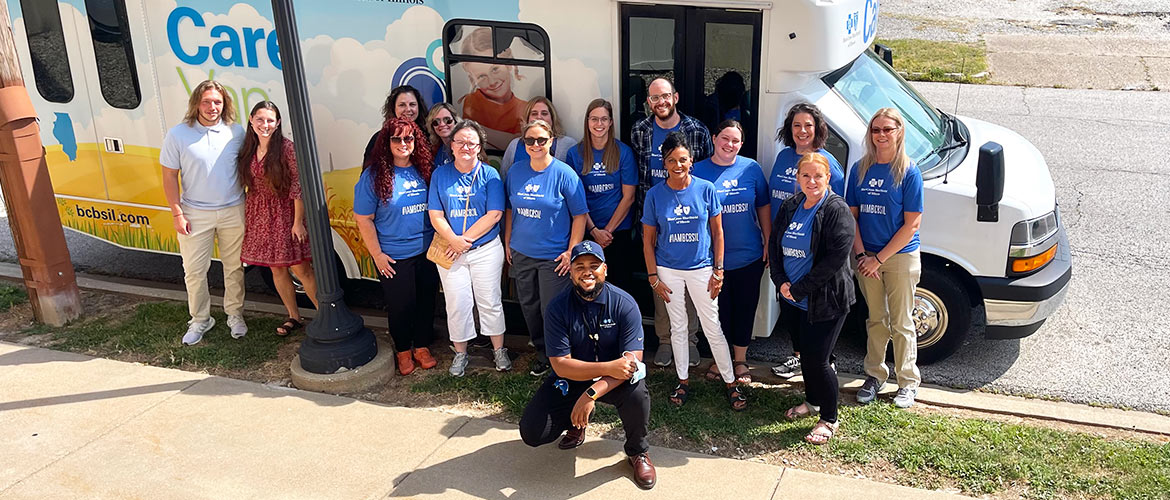Kidney disease affects 37 million American adults, including one in three adults with diabetes. Although 90% are unaware they even have it, Lisa* didn’t think her husband would be one of them.
“I knew my husband was at higher risk of developing diabetes but getting him to go the doctor is sometimes impossible,” Lisa said of her 52-year-old husband. As an activity director at a local senior center, she was the point of contact for the Blue Cross and Blue Shield of Illinois (BCBSIL) Care Van® program that organized a local kidney screening event in Quincy, Illinois, based on population health data. The Care Van invited the National Kidney Foundation of Illinois (NKFI) which conducted 40 kidney screenings that day.
With the help of 13 BCBSIL volunteers, the NKFI provided testing stations for A1C and screenings for urinalysis, glucose, body mass index, and blood pressure. BCBSIL provided health literature and food boxes to support a healthy lifestyle focused on reducing hypertension and diabetes.
“I convinced my husband to come to the event after work to get screened,” Lisa said. “I told him it wouldn’t hurt to find out his numbers.”
Her husband received his results at the event. “He was surprised but stayed calm and upbeat,” Lisa said. “His numbers were scary, so we called his primary care doctor and got him scheduled for an appointment.”
Since his diagnosis, Lisa’s husband had full blood work and kidney tests, got medicine to control his diabetes, visited a dietician and lost 10 pounds.
“My husband is very lucky to have been screened,” Lisa said. “It made a difference in our lives.”
The event was part of BCBSIL’s support of community organizations through grants, sponsorships and employee volunteerism. Lisa’s husband was not the only participant to benefit from the event. More than half tested abnormal in one or more of the tests, which are possible risk factors for diabetes and kidney disease. NKFI found those results to be about the average.
“During our 2021 screening season, 53% of our attendees had at least one abnormal screening result,” said Rachel DePauw, Senior Director of Programs for NKFI. “We developed the KidneyMobile® to conduct more kidney health screenings throughout Illinois and provide education about kidney disease, diabetes, hypertension, and nutrition.”
Another Illinoian to benefit from a NKFI event was Ted, a community health worker who volunteered at one of the KidneyMobile screenings in O’Fallon and decided to go through the screening himself.
“When he sat down with a medical professional to go over his results, he learned his blood pressure was elevated to a level that could require hospitalization,” Rachel recalls. “After speaking with our Foundation dietitian Dr. Melissa Prest and his doctor, Ted was able to manage his dangerously high blood pressure with diet and medication.”
One year later, Ted volunteered at a second KidneyMobile screening in his area and proudly reported that he’d lost 65 pounds and got his blood pressure under control. With high blood pressure being the second most common cause of kidney disease, Ted’s path to kidney failure was interrupted by early detection and prevention.
High blood pressure is the second most common cause of kidney disease behind only diabetes, according to the National Institute of Diabetes and Digestive and Kidney Diseases. High blood glucose can damage blood vessels, leading to a loss of kidney function. Ten percent of Americans have a form of diabetes and most people don’t show symptoms, which is why people should be tested regularly.
“One in three adults in the U.S. is at risk for kidney disease,” Rachel said. “Early detection and treatment of chronic kidney disease and its risk factors — including diabetes and hypertension — improves outcomes.”
Kidney damage caused by diabetes usually happens slowly, so early detection can prevent or delay further damage. The Care Van and the NKFI KidneyMobile unit are teaming up to bring more services to rural areas of Illinois.
“Working with the Care Van is critical because it allows us to reach a larger audience and provide expanded services in conjunction with our screening,” Rachel said. “For example, we had a screening event in Maywood this month, and the Care Van helped us provide vaccinations, colorectal screening kits, and produce boxes, in addition to the services provided at our kidney health screening.”
In Peoria recently, a participant named Donna said the topics were informative and the speakers were top notch. “The box of fresh foods handed out from Blue Cross and Blue Shield was great,” she said. “We were shocked when we got home and opened the box. What a great variety of produce — all in prime condition!”
The Care Van program will continue to work with NKFI in 2023 focusing on health outcomes and access to care. Each year, the Care Van program brings public health services, such as no-cost immunizations, dental sealants and health literacy, to communities where people need them most.
The vans visit schools, churches, parks, shopping centers, public housing, community events and other locations. They work with provider organizations to conduct immunization and outreach clinics in communities where at-risk families live and work. For more information on the BCBSIL Care Van program, visit the website or email CareVanProgram@bcbsil.com.
*Names have been changed for privacy.

